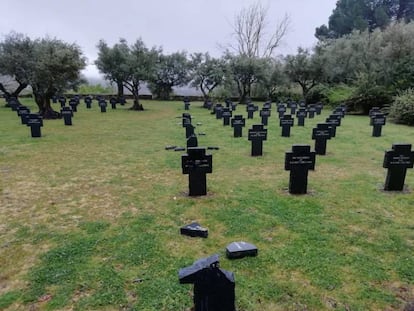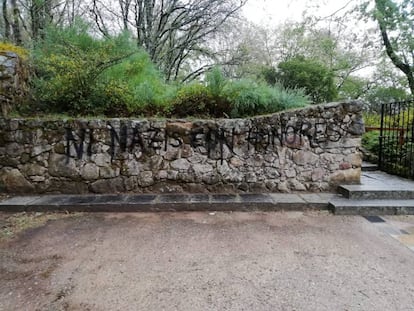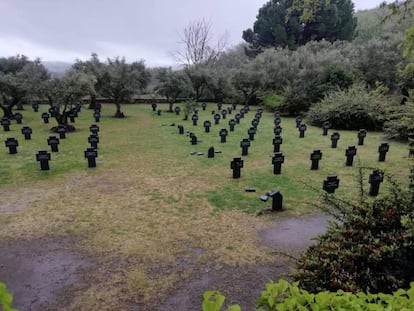Vandals desecrate graves in Spain’s only German military cemetery
Nine crosses were broken in the Cuacos de Yuste burial site in Cáceres, which was sprayed with the message: “Neither Nazis with honors nor anti-fascists in ditches”

Chema Hernández spotted the graffiti first. He was driving his tractor early Friday morning, when he saw that the wall of the Cuacos de Yuste cemetery, located in the western Spanish city of Cáceres, had been painted with the message: “Neither Nazis with honors nor anti-fascists in ditches.”
“The graffiti on the wall of the cemetery caught my attention but I continued down the road because I had to return some containers to the town next door,” he explains on the phone. When he came back, the 42-year-old worker from Cuacos de Yuste City Hall stopped outside the cemetery gate.
Every now and again you find some graffiti like ‘Get out Nazis’ but nothing more
Cemetery gardener Isidoro García
“Let’s see if they went in,” he said to a colleague. Once inside, they discovered that at least nine graves had been desecrated. The Cuacos de Yuste gravesite is Spain’s only German military cemetery and the resting place for 180 soldiers from the First and Second World Wars.
“They have left graffiti before but this is the first time that the graves [have been desecrated],” says José María Hernández, the local Popular Party (PP) mayor. “I quickly spoke with the German ambassador. We believe that it was a group of more than four people because one person could not have done it alone. We don’t believe they are from the town. Here we know very well what this means.”
Hernández says he has been in constant contact with the Civil Guard and the German embassy.
“Other years, graffiti has appeared but only occasionally,” says a spokesperson from the Cáceres Civil Guard. “But nothing compared to this. This time they have broken nine crosses.”

The German cemetery was opened on June 1, 1983, nine year after the German embassy bought the plot of land. The cemetery is situated in a picturesque spot, surrounded by cork, olive and oak trees, and next to the Yuste Monastery, where Roman Emperor Carlos V died in 1558.The cemetery is always open to the public, attracting tourists and curious visitors on the weekends. Inside there are 180 dark granite crosses lined up in rows – 26 belong to soldiers who fought in the First World War, 129 in the Second World War, 25 are In Memoriam (they don’t contain remains) and eight are unmarked. The German embassy organizes a ceremony at the cemetery every year on the second Saturday of November.
“They were aviators and marines from the two world wars whose bodies were found at different points along the Spanish coast,” Ignacio Martínez Pisón explains in the book Yuste, cementerio alemán (or, Yuste, German cemetery). “What is most striking is how young the soldiers were: there are many who were born in 1922 and died in 1943.”
The German military cemetery is looked after by Volksbund Deutsche Kriegsgräberfürsorge, an association that maintains 827 cemeteries in 45 countries. “The idea was to bring together all the dead German soldiers in Spain, who were buried as their bodies were found,” historian José Carlos Violat told EL PAÍS in an interview five years ago.
The cemetery gardener, 59-year-old Isidoro García, says the embassy has contacted him about ordering new headstones. In the four years he has worked at the cemetery, he says he has never seen such vandalism. “Every now and again you find some graffiti like ‘Get out Nazis’ but nothing more,” he says.

Cipriano Hernández, who lives 150 meters away from the cemetery, says he “didn’t see anything.” The 59-year-old believes the vandalism “had to be done in bad faith, with a sledgehammer. I don’t think the vandals were from here.”
On Saturday, several Spanish flags had been hung up across the town of Cuacos de Yuste, which is home to just 800 people. “They put them up at the two entrances [to the town] and in the square. The last one had A. H. T. R. written on it,” says Hernández. “A local told me that it could be an abbreviation of Adolf Hitler tenía razón [“Adolf Hitler was right” in Spanish ].” The flags were quickly taken down and by Monday the graffiti had been erased. “The Germans are very efficient,” explains the mayor.
English version by Melissa Kitson.
Tu suscripción se está usando en otro dispositivo
¿Quieres añadir otro usuario a tu suscripción?
Si continúas leyendo en este dispositivo, no se podrá leer en el otro.
FlechaTu suscripción se está usando en otro dispositivo y solo puedes acceder a EL PAÍS desde un dispositivo a la vez.
Si quieres compartir tu cuenta, cambia tu suscripción a la modalidad Premium, así podrás añadir otro usuario. Cada uno accederá con su propia cuenta de email, lo que os permitirá personalizar vuestra experiencia en EL PAÍS.
¿Tienes una suscripción de empresa? Accede aquí para contratar más cuentas.
En el caso de no saber quién está usando tu cuenta, te recomendamos cambiar tu contraseña aquí.
Si decides continuar compartiendo tu cuenta, este mensaje se mostrará en tu dispositivo y en el de la otra persona que está usando tu cuenta de forma indefinida, afectando a tu experiencia de lectura. Puedes consultar aquí los términos y condiciones de la suscripción digital.









































